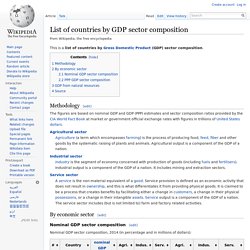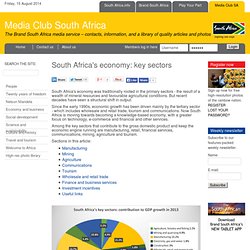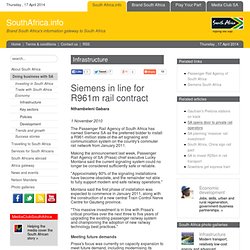

A project of Brand South Africa - Profiles. South Africa: Inspiring New Ways. South Africa: Food security to be challenging in the future. South Africa: Food security to be challenging in the future Compiled by the Government Communication and Information System Date: 11 Jul 2012 Title: Food security to be challenging in the future -------------------- Pretoria - Food security is expected to be more challenging in the next 100 years, chief executive officer of the Land Bank, Phakamani Hadebe, said on Wednesday. "I wish to highlight that the next 100 years will be more challenging than the previous 100 years regarding food security. As the world moves into the 22nd century, food security will demand new thinking and a new approach," he said at the signing of an agreement between the bank and AFGRI, South Africa's leading agricultural services company.
The two bodies on Wednesday announced that the bank had acquired the corporate lending book belonging to AFGRI's wholly owned subsidiary, GroCapital, for R1.1 billion. For the world to be able to produce enough food, technology needed to be improved. Published on: 2012-07-11. Land Bank Chief: 22nd century food-security is not guaranteed. Myheritage South Africa - Myheritage South Africa. Myheritage South Africa - Myheritage South Africa. South Africa’s primary business sector largely consists of the natural resources such as mining as well as the oil and gas exploration sector.
Several national and multinational companies operate within these sectors in contributing close to 15% to the country’s GDP annually. South Africa 's minerals industry consists of over 80% of the world’s platinum, mainly found in the North West province as well as within the Limpopo province in the north-eastern region of the country. Major conglomerates such in South Africa’s mining sector include AngloGold Ashanti Ltd; Gold Fields Ltd, Harmony Gold Mining Company Ltd (which merged with African Rainbow Minerals Ltd culminating in the formation of ARMgold.
The primary sectors business overview is mainly spearheaded around the following: Mining : coal, gold, platinum, diamond, metal and other major internationally exported minerals as well as financing segments within the industry. List of countries by GDP sector composition. This is a list of countries by Gross Domestic Product (GDP) sector composition.

Methodology[edit] The figures are based on nominal GDP and GDP (PPP) estimates and sector composition ratios provided by the CIA World Fact Book at market or government official exchange rates with figures in trillions of United States dollars. Agricultural sector Agriculture (a term which encompasses farming) is the process of producing food, feed, fiber and other goods by the systematic raising of plants and animals.
Agricultural output is a component of the GDP of a nation. Standard Bank. South Africa's economy: key sectors. South Africa's economy was traditionally rooted in the primary sectors - the result of a wealth of mineral resources and favourable agricultural conditions.

But recent decades have seen a structural shift in output. Since the early 1990s, economic growth has been driven mainly by the tertiary sector - which includes wholesale and retail trade, tourism and communications. Now South Africa is moving towards becoming a knowledge-based economy, with a greater focus on technology, e-commerce and financial and other services. Among the key sectors that contribute to the gross domestic product and keep the economic engine running are manufacturing, retail, financial services, communications, mining, agriculture and tourism. Sections in this article: Manufacturing. Cdn.bizcommunity.com/f/1202/Bizcommunity_2012_Trends_Report.pdf.
South African agriculture. Siemens in line for R961m rail contract. Nthambeleni Gabara 1 November 2010 The Passenger Rail Agency of South Africa has named Siemens SA as the preferred bidder to install a R961-million state-of-the-art signaling and communication system on the country's commuter rail network from January 2011.

Making the announcement last week, Passenger Rail Agency of SA (Prasa) chief executive Lucky Montana said the current signaling system could no longer be considered sufficiently safe or reliable. "Approximately 80% of the signaling installations have become obsolete, and the remainder not able to fully support modern and safe railway operations. " Montana said the first phase of installation was expected to commence in January 2011, along with the construction of a new central Train Control Nerve Centre for Gauteng province. Meeting future demands High-volume priority corridors.